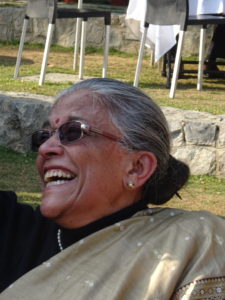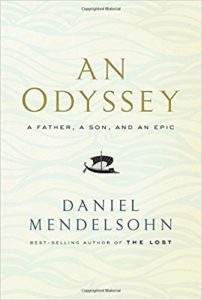Guest post: On Daniel Mendelsohn’s “An Odyssey: A Father, A Son, and An Epic”
 My mother, Dr Shobhana Bhattacharji, taught the Odyssey for many years to her undergraduate classes. She would return home to tell my brother and me the stories as well. I still recall the neat little chart she created of the adventures of Odysseus and how beautifully structured the epic was —- split into two neat halves of storytelling. These adventures have remained with us over the decades. The love for the epic she has now transmitted to my daughter as well who while getting ready for school every morning wants to hear the next episode of Odysseus’s adventures.
My mother, Dr Shobhana Bhattacharji, taught the Odyssey for many years to her undergraduate classes. She would return home to tell my brother and me the stories as well. I still recall the neat little chart she created of the adventures of Odysseus and how beautifully structured the epic was —- split into two neat halves of storytelling. These adventures have remained with us over the decades. The love for the epic she has now transmitted to my daughter as well who while getting ready for school every morning wants to hear the next episode of Odysseus’s adventures.
Recently I read Daniel Mendelsohn’s An Odyssey: A Father, A Son, and An Epic and loved it. I gave it to mum to read since I knew she would enjoy it immensely. I was right. The moment she finished it she gushed about the book as being the best she had read in recent years — and mum reads a LOT! So I asked her to write a blog post on it.
*****
Decades ago I was dragged kicking and screaming into teaching the Odyssey. I had no idea what to do with it. It was repetitious. It had no point. Nothing in the literature I was used to teaching was like it. These were soon to become famous last thoughts. I discovered the Cambridge History volumes on Troy, or what was not Troy. I learnt about the clay tablets that had some information about administration but Homer’s heroes didn’t figure in them. I discovered the lovely story of the Iliad-obsessed German Schliemann who – at a time when Homer’s stories were thought to be merely stories—believed every word of the description of places in the epics, and using Homer as his guide he uncovered Troy. Only it was not Troy but one of the many cities built above what was possibly Priam’s glorious city. When I finally visited Troy, our knowledgeable young guide was almost in tears as he showed us the deep trenches Schliemann had dug at the site to get to the ‘real’ Troy, ruthlessly destroying valuable archaeological treasures that had no meaning for him. To my delight and amazement, there really are windy plains around Troy where the Trojan War was fought for ten years. I read M.I.Finley’s The World of Odysseus, and everything about the Odyssey became clear. Its social structure, economy, ship-building, the oikos, burials, marriages, gifts, hospitality, looting, war. Everything that made up the texture of Odysseus’ world, that is, but not the nitty gritty of the tale itself. What did the gods have against Odysseus? Why does Athena pop in and out of his life? What exactly were the arabesques created by the relationships of gods and men? Jenny Strauss Clay’s The Wrath of Athena explained a lot of that and more, especially the tales within tales, such as how Odysseus got the scar on his thigh, why boars’ teeth form a motif in the epic, and why Odysseus is such a wily teller of tales. Most of all, she showed how the Odyssey is a story about the cleverness of man, of how much man can do without the gods who are largely unconcerned about mankind. There is a magnificent sarcophagus in the National Museum in Beirut with a relief of the most moving moment in the Iliad when the grieving Trojan king Priam begs the arrogant Achaean hero Achilles for the body of his son Hector whom Achilles has killed in battle. Instead of allowing Hector the funeral rites due to a hero, Achilles has desecrated his body, dragging it behind his chariot round and round the walls of Troy so that Hector’s elderly parents can see this terrible dishonour being inflicted on their first born son. On the top of the sarcophagus are two giant, half reclining gods who gaze serenely into the distance, unmoved by the human misery below, all of which they have caused. I would have been blind to its meanings had I not read Homer, Finley, Strauss Clay and a host of others. In short, I was and still am besotted by Homer’s epics. As I grow old and wear the bottom of one trouser leg rolled to accommodate the plaster on my foot, and books of complete enchantment become more and more infrequent, I return to Homer. I read as many translations as I can find. I read Pope’s translations over and over again with more happiness than I have words for. I read re-workings of the stories, some recent ones pretty thin, others pretty good.
I have just read An Odyssey: A Father, A Son, and An Epic by Daniel Mendelsohn. Mr Mendelsohn teaches at Bard College in New York. One year he decided to offer a undergraduate seminar on the Odyssey. He’d been deeply interested in Homer and Virgil for decades, but had not taught the Odyssey before. To his surprise his 82 year old father–a retired Maths professor–asked if he could attend the seminars. Daniel Mendelsohn was slightly hesitant at first. He knew his dad’s contempt for the humanities and had a feeling that he could never measure up to his father’s expectations of him in anything he did. But he said OK, and there was this 82 year old sitting a bit apart from the seventeen year olds but never absent from class, neither physically nor mentally. Mendelsohn talks about his initial difficulty in getting the students interested in the subject. His dad growling every now and then that Odysseus is no hero (he cries, he cheats on his wife, he is helped by the gods through every difficulty) is not helpful. The kids giggle, amused by Mendelsohn senior’s comments and their teacher’s discomfiture. But over the weeks, the students become more involved. They have insights that are new to Daniel Mendelsohn. Mendelsohn senior (Jay) also has new ways of looking at the Odyssey which the son may not agree with but the young students listen with respect, and add to what Jay says. With each seminar, the seasons change a bit and Daniel Mendelsohn begins to find similarities between the Telemachus-Odysseus son-father story and his life. He talks about his growing up, his parents, grandparents, siblings, his teachers — one of whom was the very Jenny Strauss Clay who so influenced my love for Homer, and whom Daniel consults during a knotty period in the semester. Quite unobtrusively, with the tiniest of nudges from Mendelsohn, you realize that his account of his life is like a modern retelling of the Odyssey. It is beautifully done. The pace is slow and graceful, like Homeric verse, and as packed with detail. Another of Mendelsohn’s old teachers suggests that when the course is over, he should he take his dad on a theme cruise retracing the journey of Odysseus. He does. The cruise takes ten days to cover the journey Odysseus took ten years to complete. The last stop of the cruise was to be Ithaka but that is cancelled. Passengers are understandably disappointed. The captain knows that Mendelsohn has translated all of Cavafy’s poetry, so he asks him to step in and talk about Cavafy’s poem “Ithaka.” Mendelsohn senior is not only impressed by his son’s talk, he actually tells Daniel as much. It is as if Odysseus has admired Telemachus. Daniel thought his dad hated travelling. But on the cruise Jay unfurls, in a manner of speaking. He loses his habitual sour expression and makes friends. He is the life and soul of the evenings. He loves the Great American Song Book, knows the words to every song, and soon has the passengers singing along with him around the piano. Jay loves it all but after seeing Troy he mutters to Daniel “The poem exceeds the place.” Indeed it does. The father dies a year after the course is over. In the early days of the course, Jay would drive from New Jersey to Bard, but then he began to travel by train. Daniel thought this was because he found the traffic too much. Jay’s complaining about the traffic in exactly the same words over and over again since Daniel was little had become as much of a formula as Homer’s rosy-fingered dawn, but he was clearly slowing down and driving was may have become a problem. After his death, Daniel Mendelsohn discovers that several of his students used to meet the old man at the station. He had found out their train timings and would wait for them. They would chat about the Odyssey in a sort of parallel seminar, occasionally sharing their discoveries with the class in the regular seminars. One of the many things I liked about the book is that Mendelsohn translates the Odyssey himself. It sounds fresh and fits well with whatever point he’s making. And then there are his many digressions into the etymology of words that one has to linger over. So much learning and compassion and yet there is nothing heavy handed about the book. Quite the best thing I’ve read in years.
Daniel Mendelsohn, An Odyssey: A Father, A Son, and An Epic (New York: Alfred A.Knopf, 2017)
5 February 2018

